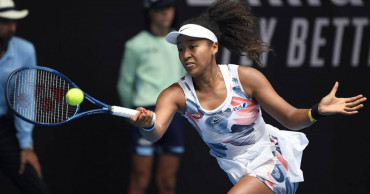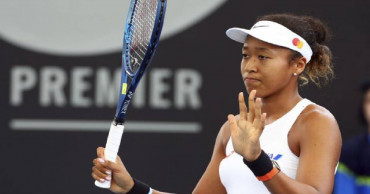Naomi Osaka
Naomi Osaka reaches Slam's third round after three years
Naomi Osaka's second-round match at the Australian Open got off to a dreadful start. After just 21 minutes, she hit a forehand service return far beyond the baseline, quickly finding herself 5-0 down, reports AP.
At the changeover, Osaka walked to the sideline, sat down, and covered her head with a white towel, shutting out everything around her and focusing only on her thoughts. She remained like this throughout the break, even managing to drink water under the towel.
Taylor Fritz advances to second round at Australian Open
This wasn't just any opponent; it was 20th-seeded Karolina Muchova, the 2023 French Open runner-up and a three-time Grand Slam semifinalist, including at Melbourne Park in 2021. Muchova had beaten Osaka in their two previous meetings, but none of that mattered. Osaka put the tough start behind her and fought back to win 1-6, 6-1, 6-3 on Wednesday.
Explaining her mindset, Osaka said, “Just be aware and try not to get so negative on yourself. The first set score was dramatic, but there were key moments where I could have won a game or two, so I kept telling myself that.”
This victory was meaningful for Osaka, who once ruled women's tennis, claiming four Grand Slam titles and rising to No. 1 in the WTA rankings. Reaching the third round of a major for the first time since 2022 marked a return to form after taking breaks for mental health and then pregnancy. Osaka’s daughter, Shai, was born in July 2023.
Since her return to tennis a year ago, Osaka has shown signs of regaining her form, including a narrow loss to world No. 1 Iga Swiatek at the French Open. This win in Melbourne, following a victory over Caroline Garcia, confirms her progress.
22-time Grand Slam champion Rafael Nadal will retire from tennis after next month's Davis Cup finals
Osaka shared, “It definitely was a goal of mine, especially after last year when I didn’t beat a seed in a Grand Slam. I’m grateful it happened so early this year.”
She also joked about getting “revenge” on Garcia, who beat her in Melbourne last year, and Muchova, both in consecutive matches.
Next up for Osaka is a clash with Tokyo Olympics gold medalist Belinda Bencic, another mother, whose daughter, Bella, was also born last year. Both players are known for their powerful play.
Bencic said, “It's going to be a fun match.”
Meanwhile, Muchova wasn't the highest-seeded player to exit Wednesday. That distinction went to No. 5 Zheng Qinwen, the 2024 Australian Open runner-up, who lost focus after being penalised for a time violation and was defeated 7-6 (3), 6-3 by 97th-ranked Laura Siegemund.
“I knew I just had to play more than my best tennis,” said the 36-year-old Siegemund.
BSJA Sports Carnival: Fazle Rabbi Moon earns double crown in table tennis competition
Aryna Sabalenka, the No. 1 seed and last year’s Australian Open champion, extended her Melbourne Park winning streak to 16 matches by defeating No. 54 Jessica Bouzas Maneiro 6-3, 7-5, as she aims for a third consecutive title.
Other women who won included No. 7 Jessica Pegula, No. 14 Mirra Andreeva, and No. 30 Leylah Fernandez, with 2023 U.S. Open champion Coco Gauff playing during the night session.
Novak Djokovic set another record by playing in his 430th Grand Slam match, surpassing Roger Federer. Despite dropping a set for the second consecutive match, Djokovic advanced to the third round with a 6-1, 6-7 (4), 6-3, 6-2 win over Jaime Faria.
Other men who moved on included No. 3 Carlos Alcaraz, who joked about his “serve bot” status after hitting 14 aces in a 6-0, 6-1, 6-4 win over Yoshihito Nishioka.
1 year ago
Naomi Osaka eliminated from Tokyo Olympics tennis tournament
The host country’s superstar is out of the Tokyo Olympics.
Naomi Osaka lost to former French Open finalist Marketa Vondrousova of the Czech Republic 6-1, 6-4 in the third round of the Olympic tennis tournament on Tuesday.
The second-ranked Osaka, who was born in Japan and grew up in the United States, struggled with her usually reliable groundstrokes while the left-handed Vondrousova produced a series of drop-shot winners and other crafty shots that drew her opponent out of her comfort zone.
Read: Pandemic Olympics endured heat, and now a typhoon’s en route
“It’s tough for her also playing in Japan and in the Olympics,” the 42nd-ranked Vondrousova said. “It’s so much pressure, I cannot imagine.”
Osaka, who lit the Olympic cauldron in Friday’s opening ceremony, won her opening two matches in straight sets following a two-month mental-health break. But conditions were different Tuesday with the roof closed because it was raining outside.
Shortly after the match was over, organizers said that Osaka had left the venue and would not be talking to the media.
Osaka spoke openly to reporters after her first two matches. That came after she announced in May going into the French Open that she wouldn’t speak to reporters at that tournament, saying those interactions create doubts for her.
Then, after her first-round victory in Paris, she skipped the mandatory news conference.
Osaka was fined $15,000 and — surprisingly — publicly reprimanded by those in charge of Grand Slam tournaments, who said she could be suspended if she kept avoiding the media.
The next day, Osaka withdrew from Roland Garros entirely to take a mental health break, revealing she has dealt with depression.
Read: Tokyo Olympics 2020: Meet the Bangladesh Athletes
She sat out Wimbledon, too. So the Tokyo Games marked her return to competition.
Playing Osaka for the first time, Vondrousova came out with her entire game clicking from the start and quickly ran out to a 4-0 lead in the first set as Osaka hardly had time to gather herself.
Osaka then broke Vondrousova’s serve in the opening game of the second set but almost immediately handed the break back when she double-faulted to make it 2-2.
After Osaka lost her serve again to end the match by hitting a cross-court backhand wide, she shook hands with Vondrousova at the net, walked to her chair, zipped her racket up in her bag and followed Vondrousova off the court.
While both players produced 22 winners, Osaka hit 32 unforced errors to Vondrousova’s 10. But it wasn’t simply an off day for Osaka; it was also an outstanding performance from Vondrousova.
“I also (beat) Simona (Halep) twice, but I think now she (Osaka) is the greatest,” Vondrousova said. “The greatest in the game, and she was also the face of the Olympics so it was tough for her, I think, to play like this.”
Osaka got a decent 64% of her first serves in play but won only 49% of the points off her first serve.
During one point midway through the second set, Vondrousova hit an underspin, scooped forehand approach shot that landed right on the line — prompting Osaka to stare at the line for a few seconds in apparent disbelief.
Read:Olympics Shooting: Baki eliminated from 10-meter Air Rifles
Osaka had break points to take a 4-3 lead in the second but Vondrousova hit consecutive drop-shot winners to get back in the game and then held.
About 10 minutes later, the match was over.
“I just really believed the second I stepped on the court,” Vondrousova said. “I think that that’s the main thing.”
4 years ago
‘The greatest honor’: Osaka lights Olympic cauldron
What a moment for Naomi Osaka. For the new Japan. For racial injustice. For female athletes. For tennis.
The four-time Grand Slam winner lit the cauldron at the opening ceremony of the Tokyo Olympics on Friday.
Read: Tokyo Olympics begin with muted ceremony and empty stadium
It was a choice that could be appreciated worldwide: In Japan, of course, the country where Osaka was born and the nation that she plays for; in embattled Haiti because that’s where her father is from; and surely in the United States, because that’s where the globe’s highest-earning female athlete lives and where she has been outspoken about racial injustice.
Plus, everywhere in between, because Osaka is a superstar.
But she has often received an uncomfortable welcome in Japan because of her race, with her family having moved to the U.S. when she was 3. Her emergence as a top tennis player has challenged public attitudes about identity in a homogeneous culture that is being pushed to change.
It’s always a mystery until the last moment who gets the honor of lighting the cauldron.
Sadaharu Oh, Shigeo Nagashima and Hideki Matsui were among the baseball greats who took part in bringing the flame into the stadium. And in a country where baseball is the No. 1 sport, Osaka was not necessarily expected to be given the ultimate honor.
But there she was at the center of the stage when a staircase emerged, the cauldron opened atop a peak inspired by Mount Fuji and Osaka ascended with the Olympic and Japanese flags blowing in the breeze off to her left. She dipped the flame in, the cauldron ignited and fireworks filled the sky.
“Undoubtedly the greatest athletic achievement and honor I will ever have in my life,” Osaka wrote on Instagram next to a picture of her smiling while holding the flame. “I have no words to describe the feelings I have right now, but I do know I am currently filled with gratefulness and thankfulness.”
Read: Olympics ceremony uses music from Japanese video games
It capped quite a series of events over the past two months for the 23-year-old Osaka.
Going into the French Open in late May, Osaka — who is ranked No. 2 — announced she wouldn’t speak to reporters at the tournament, saying those interactions create doubts for her.
Then, after her first-round victory, she skipped the mandatory news conference.
Osaka was fined $15,000 and — surprisingly — publicly reprimanded by those in charge of Grand Slam tournaments, who said she could be suspended if she kept avoiding the media.
The next day, Osaka withdrew from Roland Garros entirely to take a mental health break, revealing she has dealt with depression.
She sat out Wimbledon, too. So the Tokyo Games mark her return to competition.
“The Olympics are a special time, when the world comes together to celebrate sports. I am looking forward most to being with the athletes that had waited and trained for over 10 years, for celebrating a very hard year (2020) and having that happen in Japan makes it that much more special,” Osaka wrote in an email interview when she was selected as the 2020 AP Female Athlete of the Year. “It’s a special and beautiful country filled with culture, history and beauty. I cannot be more excited.”
There was a big hint that Osaka might have an important role in the ceremony when her opening match in the Olympic tennis tournament was pushed back from Saturday to Sunday without an explanation earlier in the day.
She was originally scheduled to play 52nd-ranked Zheng Saisai of China in the very first match of the Games on center court Saturday morning. But clearly by lighting the flame as midnight approached, she wouldn’t have had enough rest for an early morning match.
Osaka became the first tennis player to light the Olympic cauldron. She’s also one of the few active athletes to be given the honor. Australian sprinter Cathy Freeman lit the cauldron for the 2000 Sydney Games and went on to win gold in the 400 meters.
Osaka — along with top-ranked Ash Barty — is a favorite to win the women’s singles title in a tennis tournament that also features Novak Djokovic aiming to become the first man to win a Golden Slam by holding all four Grand Slam trophies and Olympic gold in the same year.
Whatever the final results on the court, Osaka has already become part of Olympic history.
4 years ago
Sponsors hail Naomi Osaka’s ‘courage’ on mental health
A few years ago, a star athlete dropping out of a major tennis tournament over mental health issues might have been seen as a sign of weakness.
Today, at least for Naomi Osaka’s corporate sponsors, it is being hailed as refreshingly honest.
That would explain why so many of them have stuck by Osaka after the four-time Grand Slam champion announced Monday that she was withdrawing from the French Open because she didn’t want to appear for the requisite news conferences that caused her “huge waves of anxiety.”
Osaka, who also acknowledged suffering “long bouts of depression,” received criticism by some who say the media events are just “ part of the job. ” But Nike, Sweetgreen and other sponsors put out statements in support of the 23-year-old star after she revealed her struggles.
Read: Naomi Osaka wins 2nd US Open title
“Our thoughts are with Naomi,” Nike said in a statement. “We support her and recognize her courage in sharing her own mental health experience.” Sweetgreen tweeted that its partnership with Osaka “is rooted in wellness in all its forms.” And Mastercard tweeted: “Naomi Osaka’s decision reminds us all how important it is to prioritize personal health and well-being.”
Allen Adamson, co-founder of marketing consultancy Metaforce, said that Osaka’s disclosure has made her a more authentic spokesperson — and more valuable to corporate sponsors.
“Every athlete gets a sports sponsorship because they win games or perform well,” he said. “But the best ones become true brand ambassadors when they have a broader persona. The best brand ambassadors are real people. (Osaka) is talking about an issue that is relevant to many people. Mental health is a bigger issue than winning or losing tennis.”
Reilly Opelka, a 23-year-old American tennis player seeded 32nd at the French Open who plays his third-round match Friday, told The Associated Press he’s glad Osaka “is taking time to get better.”
“She’s one of the best players in the world — she’s very influential,” Opelka said. “The sport needs her. She’s an icon. It’s bad for the sport to have one of the main attractions not around.”
Osaka, who was born in Japan to a Japanese mother and Haitian father, moved to the United States with her family when she was 3, and now lives in Los Angeles.
She has taken a leading role in protesting the deaths last year of George Floyd and other Black people who died at the hands of the police, wearing a mask with a different victim’s name on each match day at the 2020 U.S. Open. She was named the 2020 AP Female Athlete of the Year.
Read: Naomi Osaka wins 1st-round match at Brisbane International
According to Forbes, Osaka is the world’s highest-paid woman athlete, earning $37 million in 2020 from blue-chip sponsors such as Tag Heuer, AirBnB, and Louis Vuitton in addition to Mastercard and Nike.
Nike has stood by sports stars after other controversies, including Tiger Woods after his 2009 sex scandal and former 49ers quarterback Colin Kaepernick after he knelt during games to protest police brutality against Black people. But it recently dropped Brazilian soccer star Neymar after he refused to cooperate with an internal investigation into sexual assault allegations from a Nike staffer.
Osaka’s disclosure comes as celebrities and other public figures openly address their own issues with depression and anxiety. Prince Harry and his wife, Meghan Markle, shared their experiences in a televised interview with Oprah Winfrey and have since teamed with her to create a mental health focused series called “The Me You Can’t See,” in which Prince Harry talks about working through anxiety and grief.
Osaka also joins a growing list of top-tier athletes speaking out about mental health. Olympic swimmer Michael Phelps, NBA players Kevin Love and DeMar DeRozan, and the WNBA’s A’ja Wilson have all spoken very publicly about their bouts with depression, sharing both the successes and setbacks.
The four Grand Slam tournaments reacted to Osaka’s withdrawal by pledging to do more to address players’ mental health issues. The episode also could serve as a tipping point for the professional tennis tours — and leagues in other sports — to safeguard athletes’ mental, and not just physical, health, said Windy Dees, professor of sport administration at the University of Miami.
“It’s absolutely a growth opportunity for the (Women’s Tennis Association) and all leagues, there’s a lot of work to be done,” Dees said.
Marketing consultant Adamson believes Osaka’s decision to come forward will encourage many more athletes to divulge their own mental health battles. He noted that if Osaka had revealed her bouts with depression 10 years ago, her corporate sponsors likely would have stayed on the sidelines because the issue had been taboo. But, he noted, the pandemic has raised awareness around mental illness.
Read: Naomi Osaka's knee injury brings uncertainty to US Open
From August 2020 to February, the percentage of adults with recent symptoms of an anxiety or a depressive disorder increased from 36.4% to 41.5%, according to a survey by the U.S. Centers for Disease Control and Prevention and the Census Bureau.
The survey also found the percentage of those reporting they didn’t get the help they needed increased from 9.2% to 11.7%. Increases were largest among adults aged 18–29 years and those with less than a high school education.
Ken Duckworth, chief medical officer for the National Alliance On Mental Illness, said Osaka’s decision to go public is a positive development for all people who feel isolated.
“We are moving from mental health and mental illness as a ‘they” thing to a ‘we’ thing,” he said. “These are ordinary common human problems. And I firmly believe that isolation and shame directly contributes to people not getting help. I look at a great athlete, an exceptional athlete, as one potential role model.”
4 years ago
4 for 4: Osaka wins Australian, stays perfect in Slam finals
As Naomi Osaka strode through the Champion's Walk leading to the court for the Australian Open final — headphones on her ears, racket bag strapped to her back — she reached out her left hand to tap a panel marked with her name and the year of her previous title there.
5 years ago
Serena Williams, Osaka drawn in same half at Australian Open
Majors are what matters at this stage for Serena Williams.
5 years ago
Naomi Osaka wins 2nd US Open title
Naomi Osaka defeated Victoria Azarenka from Belarus 1-6, 6-3, 6-3 in the final to win the women's singles title of the US Open on Saturday.
5 years ago
Australian Open Glance: Barty sees opposition disappear
A quick look at the Australian Open:
6 years ago
Coco Gauff sets up Osaka showdown in Australia; Serena wins
Plenty was going badly for Coco Gauff in the second round of the Australian Open.
6 years ago
Naomi Osaka wins 1st-round match at Brisbane International
Naomi Osaka got an extended workout in her opening match at the Brisbane International, just two weeks away from the defense of her Australia Open title.
6 years ago





.jpg)








